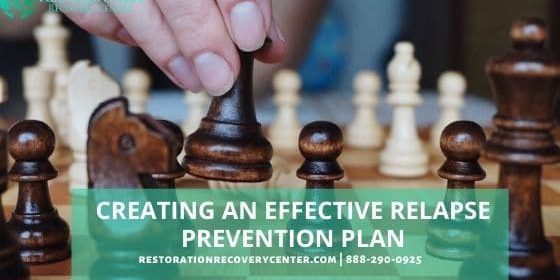Creating an effective Relapse Prevention Plan
One of the steps to prevent a relapse is to recognize that addiction to drugs is a disease in itself. Therefore, making a decisive choice to stop using substances is not as easy as most people think especially if an addiction has already developed.
It may take a lot of time, practice and patience, not to mention self-discipline to avoid relapse. Just because relapses are normal, it does not mean that someone should not make an effort to fight them.
Below, let us look at steps to be followed in a relapse prevention plan to make it a success.
Engaging in a long term treatment program
Just like in any other chronic disease, treatment for addiction is not a quick fix. One time medication or a month of therapy cannot guarantee you a complete solution. For a long term addiction relapse prevention, you might want to get involved in a long term intensive treatment which should be followed by a continuous support system.
According to research, active participation in a treatment process can significantly reduce the risk of addiction relapse. Individuals who are at risk of relapsing should also be offered a continuous support from their counsellors to prevent addiction relapse.
Identify triggers and know how to manage them
A good treatment plan should help you identify things that remind you of your former life in substance abuse and how you can manage the feeling of wanting to go back to that life. Triggers may include general activities such as being around people who are still in substance abuse or certain places that remind you of the former life. These two are the most common triggers.
Emotions can also trigger relapse, especially for individuals who were into substance abuse as a way to cope with stressful situations. Therapy sessions will help you identify each one of these triggers and present a doable management plan so that you can successfully prevent addiction relapse
Be honest to people who are trying to help you
Relapse and the better part of addiction requires constant lying and denying that you are relapsing or already fully on addiction again. You will find that you are always hiding the addiction substances and denying it if somebody asks you if you are still using them.
This will gradually lead you to lie to yourself because the moment you find that you are not being completely honest, it is a sign of emotional relapse.
There is a saying that you are as sick as the addiction secrets you keep. If you ask counsellors, one of the most challenging things in an addiction therapy institute is how to teach the patients how to tell the truth. They are also taught the importance of admitting when they are not totally truthful and how to correct their mistakes quickly. One test to gauge your honest is if you are honest to the point that it is uncomfortable. At this point, you are on the right track of the relapse prevention plan.
Practice self-care
Understanding self-care is one of the methods used in the center for substance abuse treatment in California to help the patients recognize the reasons why they were in substance abuse in the first place, and how to manage these reasons so that they are not tempted to relapse.
It also helps them to identify other healthy options for solving the issues that may lead them to addiction. There is a distinct difference, however, between self-care and selfishness. To learn self-care methods, most people always end up being selfish instead. For this reason, the services of a counsellor are required to guide you through self-care recognition process and avoid falling into selfishness.
The most important note in the relapse prevention plan is to know that avoiding the addictive substances is not the only step needed.
Recovery requires an individual to create a new life in which they will not need the substances for survival.
At the Alcohol & Drug Rehab Center, we will help you make significant changes in your lifestyle towards a future that is fruitful and free of substance abuse. The center for substance abuse treatment in California will, take you through a long term process, which will eliminate the risk of relapse. Come to us, and we will walk with you through the journey to full recovery.






